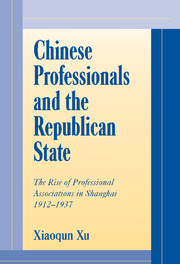 Chinese Professionals and the Republican State
Chinese Professionals and the Republican State Book contents
- Frontmatter
- Contents
- List of Tables
- Acknowledgments
- Abbreviations of Frequently Cited Sources
- Introduction
- Part I Professions and Professionals
- Part II Social Institutions, State Actions, and Professionalization
- 3 The Republican State and Urban Associations
- 4 The Republican State and the Legal Profession
- 5 The Republican State and the Medical Profession
- Conclusion to Part II
- Part III Professionalism, Nationalism, and Politics
- Conclusion
- Glossary
- Bibliography
- Index
4 - The Republican State and the Legal Profession
Published online by Cambridge University Press: 07 September 2009
- Frontmatter
- Contents
- List of Tables
- Acknowledgments
- Abbreviations of Frequently Cited Sources
- Introduction
- Part I Professions and Professionals
- Part II Social Institutions, State Actions, and Professionalization
- 3 The Republican State and Urban Associations
- 4 The Republican State and the Legal Profession
- 5 The Republican State and the Medical Profession
- Conclusion to Part II
- Part III Professionalism, Nationalism, and Politics
- Conclusion
- Glossary
- Bibliography
- Index
Summary
CHAPTER 3 illustrates the persistent suspicions the Republican state held toward voluntary associations from the Beiyang period through the Nanjing Decade. It is against that background that the policies of the successive Republican governments toward professions and professional associations are to be examined. Of all social organizations, professional associations appeared to be the most legitimate ones because their publicness was asserted by themselves and assumed by the state and the general public. To effect a modern state, the successive Republican governments paid a great deal of attention to the reforms in the judicial system and engaged in the construction of its institutional infrastructure. In so doing, the state promoted the legal profession and accepted bar associations as legitimate institutions. This chapter will take a close look at the ways the Republican state promoted and regulated the legal profession.
THE LEGAL PROFESSION IN THE BEIYANG PERIOD
The Regulations on Lawyers
The judicial reform that had begun in the late Qing prepared the ground for the development of a modern judicial system in China. The draft criminal code issued in 1910 provided for the practice of legal representation by lawyers on behalf of both the defendant and the plaintiff. When the Republic of China was founded, there were already some lawyers in Shanghai and elsewhere.
- Type
- Chapter
- Information
- Chinese Professionals and the Republican StateThe Rise of Professional Associations in Shanghai, 1912–1937, pp. 107 - 128Publisher: Cambridge University PressPrint publication year: 2000
